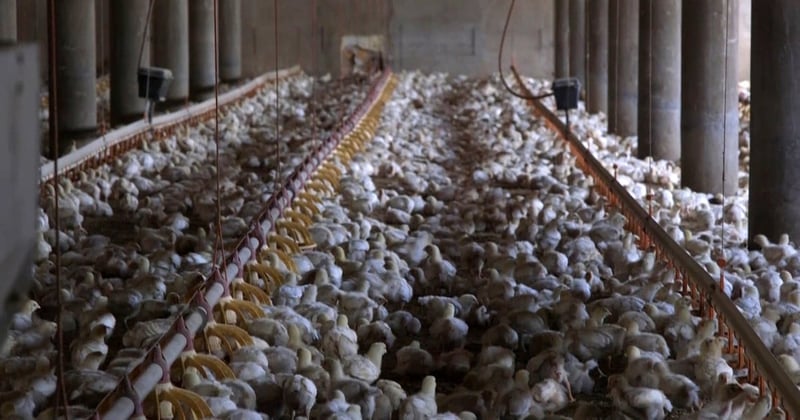
Billions of the world’s chickens are suffering in secret
News
Global charity calls upon KFC to improve chicken welfare
Few people know that the mass production of meat chickens is one of the biggest causes of animal suffering in the world say World Animal Protection today (4 October) as they launch a new campaign urging one of the largest suppliers of chicken, KFC, to improve living conditions for the chickens served up in their restaurants.
Consumers are being kept in the dark, say the charity, as they release a new global poll revealing just how little we know about the chicken on our plate.
The poll – of 12,000 people worldwide - shows that although people are concerned about what they eat, very few know where that meat has come from.
What the poll tells us about consumer views:
- Four out of five (79%) did not know that a chicken will only live on average 42 days
- Of those who eat chicken, four out of five (81%) said they would not buy chicken from a fast-food chain if they knew it had suffered serious health problems as a result of living in a cramped industrial farm
- seven out of ten (71%) never ask where their chicken comes from at fast-food outlets.
World Animal Protection CEO, Steve McIvor said: “This conveyer belt of rapidly grown chickens comes at a price. Behind the world’s favourite meat is an unacceptable cost of suffering that is increasing as the global demand for chicken grows.”
On average, sixty billion meat chickens are raised for global consumption each year. Nearly 2,000 chickens are slaughtered every second on average. An estimated two thirds of these animals (40 billion) live in bleak, overcrowded sheds or cages with little or no natural light or fresh air, unable to perform many natural behaviours, such as scratching, pecking and dustbathing.
Many chickens will suffer painful lameness, and overworked hearts and lungs from the speed at which they are grown, and wounds like skin sores and burns from spending too long in their own waste. The chickens’ lives are miserable but they are also shockingly short – many are slaughtered while still babies, at as young as five weeks old.
World Animal Protection is now challenging one of the largest fast-food retailers of chicken, KFC, to improve the welfare standards of the chickens they serve up in their restaurants. The charity is calling for slower-growing birds with more space, enrichment and natural light to allow for a better quality of life.
KFC’s animal welfare policy, developed by their parent company Yum! Brands which states their goal “is to work only with suppliers that demonstrate and maintain compliance with animal welfare practices.” However, they are currently ranked in the second lowest position by Business Benchmark on Farm Animal Welfare (BBFAW), the global measure of company performance on animal welfare.
Steve McIvor continues: “We need to expose the woefully poor conditions that many factory-grown chickens are living in. They are suffering in secret, behind closed doors and away from public view. KFC has a huge stake in the market with more than18,000 outlets in 115 countries, we’d like to see them use their global influence to show they care about the welfare of chickens.”
The public is being urged to sign-up to make Change for Chicken.
ENDS
Note to editors
- For an interview with a spokesperson, contact Kai Akram kaiakram@worldanimalprotection.org +44 (0) 7939 029 006 or Bev Boyle bevboyle@worldanimalprotection.org +44 (0) 7239 0563 / +44 (0) 7968 415 856
- B-roll footage of industrially farmed chicken in sheds and cages available. These are not linked to a particularly fast-food retailer – they are examples of industrial farming to highlight some of the welfare conditions.
- The Business Benchmark on Farm Animal Welfare (BBFAW) is supported by Compassion in World Farming, World Animal Protection and investment firm Coller Capital. The BBFAW ranks around one hundred of the world’s largest food companies on the quality of their management and disclosure of farm animal welfare. Read the full report here.
- We polled in twelve countries: UK, Sweden, Netherlands, Denmark, USA, Canada, India, Brazil, Thailand, New Zealand, Australia and China. The poll was conducted by TNS Global.
- The questions we asked in the polling were:
- On average, approximately how long do you think a factory farmed chicken lives for before they become chicken meat in your country?
- When ordering chicken at a fast-food outlet, do you ever ask or check where the chicken comes from? By this we mean the type of place it was reared and not the country it came from.
- Thinking still about buying chicken at a fast-food outlet. If you knew that the chicken, you were buying had experienced deformities or serious health problems.